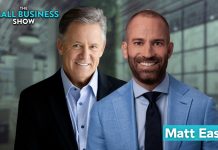Welcome to another episode of Atlanta Franchise Today with host Leslie Kuban, expert franchise consultant and owner of FranNet Atlanta. Atlanta Franchise Today is dedicated to bringing entrepreneurs and business owners the best practices and tips for their franchise goals.
When we talk about franchising, most of us are thinking about what’s for lunch? As opposed to how the franchising industry as a whole contributes to our economy. The numbers and the impact are staggering. On today’s episode, Leslie sits down with Sherri Seiber, President and Co-owner of FranFund, a leading business funding strategy organization. She is among Entrepreneur Magazine‘s top 100 Women of Impact and Global Franchise Magazine‘s top 20 Women in Franchising.
Transcription:
Leslie Kuban:
Sherri, welcome to the show.
Sherri Seiber:
Thanks so much, Leslie. It is a pleasure to be here.
Leslie Kuban:
That is quite the trophy case, my friend. Congratulations.
Sherri Seiber:
Thank you so much. And I must say, I was stunned every time.
Leslie Kuban:
Well, our viewers who are just getting to know you, tell us a little bit about your background and FranFund. What you do and for whom?
Sherri Seiber:
Well, my background early career was in operations in telecommunications. So Motorola, Flextronics, that kind of thing. My husband was enfranchising from day one of his career. And the progression was about 15 years ago, my husband decided there was a place for a one stop shopping funding solution, which had not been done before. Before, each individual potential owner would have to go to their local bank or try and find some solution for funding. So the idea was multiple funding solutions under one roof. Which the primary ones are SBA lending, of course, and then a process called rollover for business startup. Which allows people to use retirement funds, tax deferred and penalty free. So that’s what FranFund does. And we get to work with an amazing array of entrepreneurs throughout the country to help them find just the right funding solution to make their dream of business ownership come true.
Leslie Kuban:
And that’s so rewarding to work with people, many of whom this is their first step into business ownership of any kind, and to be a part of that journey of helping them strategize so that they step into it successfully.
Sherri Seiber:
We have seen so many success stories, but we see the fear, we see the angst that they go through. And right now the choices they have are staggering. So we’re in a wonderful position to watch this process.
Leslie Kuban:
And now, you mentioned, you see a lot of entrepreneurs and a lot of franchises, you kind of have this interesting bird’s eye view of the industry as a whole. And I’d love to pick your brain about, what do you see in the economic impact of franchising? This is something that you have a unique position to have some visibility into. What do you see?
Sherri Seiber:
I’m going to give you some very surprising statistics, that every time I roll out these stats, the person I tell always has the jaw drop. First of all, people are always surprised to learn that one out of every eight jobs in this country have something to do with franchising. I mean, that is a staggeringly impressive statistic. And nobody knows that because they think the big three franchises are KFC, Taco Bell, and Chick-fil-A. I left McDonald’s out of that, because Chick-fil-A’s very popular.
Sherri Seiber:
But the second part of that is, there are about 800,000 franchise establishments in the US. And that is every market segment imaginable from commercial and residential services to fitness, to quick service restaurants, which most people recognize, automotive, et cetera. And over 4,000 different franchise brands, 4,000. So most people can’t name 10, much less up to that number. So that’s a very interesting statistic. And then the contribution to the economy, therefore stands to reason that over $700 billion contribution to the US economy would be yielded from all of those statistics. So fantastic industry.
Leslie Kuban:
And most of us don’t know that we’re soliciting franchise businesses when we do every day. The place where you got your haircut, the dog groomer that took care of Fluffy, the package that you shipped at the package logistics store, all of these are part of franchise brands. So many of us use franchises in our businesses and in our personal lives every day and we don’t even know it.
Sherri Seiber:
Absolutely true.
Leslie Kuban:
So what we’re seeing on the headlines a lot, of course, is the great resignation. I mean, we see it every day on the media and LinkedIn. I’m interested, how is this showing up in entrepreneurship and franchising in your world?
Sherri Seiber:
Well, franchising is winning again with that statistic because what we think happened, actually, we see it happen on a daily basis. Folks sat home during COVID and on their sofa and they looked around and thought, “This is sort of a nice situation here. I wonder how I could continue being in charge of my own life.” And so those people are seeking business opportunities and realizing that, hey, their ability to be an entrepreneur is equal to those people that they are working for and they want to check it out.
Sherri Seiber:
And so what we’ve seen happen, our business in when the world fell apart in March of 2020, dipped for only about six weeks. And then we started seeing a steady rise of interest of potential opportunities coming to us. And that rise continued through 2020, through 2021, and there is no stop in 2022. I am so excited to see what’s going to happen.
Leslie Kuban:
And this showed up, Sherri, and people coming to you for funding solutions. So, does this mean that translates into an uptick, a large uptick in people exploring entrepreneurship? Is that what that translates into-
Sherri Seiber:
Absolutely.
Leslie Kuban:
Your business in the last couple years?
Sherri Seiber:
Absolutely. Because, well, one thing about … we don’t really sell FranFund, so to speak. Because unless you are buying something, you don’t need us. So the people that come to us are exploring business ownership and they want to see what their funding options are and if they qualify and how all that will work. And so that’s why we get to see sort of the behind the curtain in the process.
Leslie Kuban:
What you described mirrors what my experience was, as well. March to May of 2020, things just stopped. But then it was like the spigot turned on, people got used to being at home more and being in more control of their time. It doesn’t mean they weren’t necessarily working less, but they weren’t on airplanes, they weren’t commuting in traffic back and forth to the day job. And they just kind of got used to more autonomy over their schedule and how their time is balanced with other things and their lives. So we saw that uptick and interest in entrepreneurship for that flexibility driver alone.
Sherri Seiber:
Right. The flexibility piece I believe is … well, it may not be everyone’s why, but it is certainly a big why for many people. One other statistic that we can confirm, we’ve heard this reported nationally, but we can also confirm. The average age of these potential entrepreneurs is trending lower. And that’s exciting as well-
Leslie Kuban:
Yeah.
Sherri Seiber:
Because we have a whole lot of millennials that are out there.
Leslie Kuban:
Right. That are of age that have enough experience in the workforce, that have built up some capital. And kind of got exposed to entrepreneurship early in their career or even in their education. So that’s-
Sherri Seiber:
Absolutely.
Leslie Kuban:
Exciting for franchising.
Sherri Seiber:
Very exciting.
Leslie Kuban:
So tell us a little bit about what you’ve seen over the last couple of years. Let’s talk about categories, winners in franchising. You sit in the perspective of funding, so any standouts from that perspective?
Sherri Seiber:
I have to mention the fact that service businesses have taken a dramatic leap. I’ll just say upfront, service and fitness are two huge ones. I could go further with that, but let me talk about those for a second. When I say service, I’m talking about everything from gutter cleaning, window cleaning, insulation installation in your house, roofing, mosquito mitigation. You could just go on and on and on with the different varieties of service businesses. And I am sure your audience has used some or all of the things that I just mentioned. And there’s further category that extends to that.
Sherri Seiber:
The second part of that is the fitness piece. Fitness has sure come a long way from even five years ago, but 10 years ago, dramatic. Whereas now, you have unique fitness for each thing you want to do. You have Pilates, you have cycling, you have yoga, you have martial arts. Which that can fit into both a fitness category and childhood education category because that’s a very interesting branding. You can’t forget senior care because of us boomers that are turning 60 at the rate of 10,000 a day or some staggering thing like that. So those are three categories that are winning among others.
Leslie Kuban:
Let’s go back to fitness for a second. A lot of fitness centers, gyms had to close down at least for a period of time over the pandemic. Have you seen that bounce back? Or what does that look like from your perspective?
Sherri Seiber:
So this again is where the value of franchising comes in. Some of these franchise brands immediately took action and said, “Okay, what can we do to accommodate the cleanliness? The sort of safety features that need to be implemented to make this work?” The social distancing, the sanitizing and all those kinds of things. Those brands at the headquarter level, went about putting in these standards and then rolling that out to the franchisees across the country and that worked very well. And so even though you would think, “Hey, fitness, oh my gosh, I’m a foot away from somebody on the next bike.” They fixed all that with distancing. And the people sitting home on their sofa, they were tired of sitting home on their sofa. And so they started going back to work out. So it was a perfect circle that was closed with that situation. And it’s continues to climb.
Leslie Kuban:
Right. Now our beloved fitness centers are even cleaner than they were two years ago.
Sherri Seiber:
They really are. They really are.
Leslie Kuban:
So Sherri, now that we’re early in 2022 and a lot of people continue to explore entrepreneurship as a side career or as a next career. What do they need to know about funding solutions coming into this year? Any changes there to be aware of?
Sherri Seiber:
Lenders want to lend because that’s why they’re in business. But they do want to see strong financials, which is not a surprise to any of us. So if you’re seeking an SBA loan, they are available from 50,000 to 5 million. And there are some criteria that you have to achieve to get a SBA loan.
Sherri Seiber:
But the second thing that is available is a process called rollover for business startup. The acronym for that is ROBS and the IRS lovingly calls the process that ROBS. But what it means is, you can use qualified retirement funds. So that means funds from a previous employer or from an IRA or several other types of retirement accounts to invest in your own business. And so at the end of that transaction, your 401k now holds shares of stock. And your operating account contains capital that can be used for any legitimate business expense. So what we see happening a lot is people use their 401k or the ROBS process as the equity injection for the SBA loan. And that is working out very, very well. There are some other ways to use funding. There’s home equity loans, of course, there’s some lines of credit, things like that. I mean, that’s one of the benefits, I guess, of working with FranFund is we help each person at explore all of those things.
Leslie Kuban:
And that really is … and working with you, what I found a great benefit for my clients and referring to you is you’re really about the strategy. Putting together the strategy, looking at the type of business someone wants to go into, looking at their assets, their credit and then strategizing the best one, two or three ways to capitalize the business that they want to get into. So thank you for that.
Sherri Seiber:
Yes. Thank you. That is exactly the reason we exist.
Leslie Kuban:
And a lot of the people you work with are new to business ownership. This is the first time they’re dipping their toe in the water of being their own boss. What kind of advice would you have for those folks? First steps, whether it’s funding or otherwise to set themselves up for success?
Sherri Seiber:
The best advice I would have for somebody is to, first of all, remember what I said first. There are 4,000 franchise brands out there. How are you going to weed through those brands on your own? I highly recommend working with a professional franchise consultant and of course that’s what Leslie does, but I mean this sincerely. Those folks understand the industry, they have a highly curated portfolio of franchise brands that cover all the market segments that somebody should consider. They have access to what territories are available, they know what brands could fit your particular lifestyle, financial goals, your long term goals, your time goals, all of those things. And can help steer you in the right direction. And so that happens in the beginning.
Sherri Seiber:
And then as you start your investigation, they’re your sounding board, your coach of, hey, I learned this. We might pivot here or whatever. So we see it every day, we see the people that go through the process, the quickest, the most efficiently. And end up ultimately the happiest are ones that worked with a franchise coach. We’ve had some people that tried it on their own that after a year were still spinning their wheels because they couldn’t find the right one or couldn’t make a decision and didn’t have anybody to help them through that decision making process. So, that would be my recommendation.
Leslie Kuban:
And I’m of course biased in agreeing with you, that’s my line of work. And I have hundreds of well qualified colleagues providing the same good services as we do at FranNet. And one of the things that we suggest as a first step, kind of throwing it back in your world, Sherri, is to understand what your funding options are. And if a loan is going to be a part of those options, is to maybe even take that a step further in getting an SBA loan prequalification. And sometimes people are resistant to that. They assume they’re going to be able to get a loan, or they want to just focus on the business search first and then worry about the financing. And that’s an area where I find people can spin their wheels and be disappointed in the end. Can you maybe speak to the value of what an SBA loan prequalification is? And why someone really might want to make that is one of their first steps in their expiration process?
Sherri Seiber:
Excellent points and two easy analogies are, first of all, you don’t go shopping for a house until you know what price range you’re looking in. And second, you really don’t go shopping for a car until you know what price range you’re working in. Both of those scenarios will set you up for great disappointment if you have your heart set on something and then find out, oh, my that’s a few dollars outside of your price range.
Sherri Seiber:
So, what you can do though, is come to a company like FranFund and at no cost to you, to do a preapproval process, is to have us analyze your financial situation, find out what is possible. And that’s especially a point of important for a first time buyer, because really most people, the only big purchase they’ve ever made in their life is a home. And so there are a lot of factors to the preapproval. What’s your monthly spending? What’s your credit score? What kind of cash do you have on hand? All of those things go into the preapproval process and are really important to understand before you get too deep into your franchise investigation and potentially get disappointed.
Leslie Kuban:
And those are great analogies, but as you and I know, it’s not the same process applying for a business loan. There’s not the same variables, you are not evaluated by the bank in the same way, as if you’re applying for a small business loan. It is a bit of a different process and I find sometimes people think they will qualify when they don’t. So, you and I are on the same page that this really is an important step to take first, to make sure that you’re working from a place of reality and can focus on the options that best fit all of your criteria, all of your needs and goals, including what’s affordable for you.
Sherri Seiber:
So thank you for pointing that out. And just to make that even clearer, I will say that with buying a house, the bank knows where that house is. And they know that if they have to take it back, they know where it is and what to do with it. When buying a business, especially as a first time business owner, the banks do understand now … many banks, not all banks. But they understand the value proposition is affiliated with the franchise world. That in franchising, you are buying a system, you’re buying a repeatable process that’s been proven. But you, the borrower, may not have been proven yet.
Sherri Seiber:
Because even though you say you’re going to get up every morning and go work the process, work the business, the bank has no data really to support that until we do this preapproval and we kind of dive into your credit situation. And so that’s why it’s not your father’s bank where your father could go into a bank and say, “Hey, Sam, I’d like a line of credit.” And Sam goes, “Okay, here’s the paperwork.” It’s not like that anymore. So we got to go a little deeper.
Leslie Kuban:
Yeah.
Sherri Seiber:
It’s very important to get that preapproval in place.
Leslie Kuban:
And I always like to end on success stories, Sherri, I know you have many at FranFund. But do any come to mind, one of your clients that stepped into business ownership, stepped into franchising for the first time and you helped them. And now they look back and said, “I wish I’d done it sooner.” We love those stories. What comes to mind in your world?
Sherri Seiber:
Well, of course we could spend the rest of the day on this, but I’m going to tell you one. This man came to me with his sister-in-law who was a nurse, and they had decided to invest in BrightStar, which is a home healthcare business and possibly you’ve seen the commercials on television with the founder. He came to us, I guess it was 11 years ago with this idea. And so used his 401k, he had been an accountant with a large firm, had quite a bit of money in his 401k, and that’s how he funded the entire thing. So his sister-in-law was going to be the business partner and have the medical side, et cetera, et cetera.
Sherri Seiber:
So using the 401k, he was able to offer his employees the ability to participate in that 401k, just like you do in people’s current jobs now. So he’s running his company, he’s hiring employees, it’s a attractive for employees to come and work for him because they can participate in the 401k and contribute. So he runs this business, increases the revenue. At the end of his 10 year franchise contract, which coincided coincidentally with his 64th or fifth birthday, he decides to sell the business and cash out. So his couple of hundred thousand dollars investment turned into a seven figure reward at the end, which he was able to put back into his 401k, tax free. And so now he’ll pay the taxes as he takes distributions. But then throughout that entire time, his employees have also been building up their 401ks, he’s been able to do matching with these folks, as well as himself. And so it’s just a great story. He is very, very happy. BrightStar was very happy with that whole system and so great success story. He’s gone off into the sunset.
Leslie Kuban:
And that’s such a great story. And the planning you do today and you map it out can really impact the result that you achieve five, in this case, 10 years later in the future. And you’ve really touched on a point that I’m going to circle back to in a future episode of how franchising is not just a business to own, it’s not just a source of income. It’s an investment that can appreciate in value with tax strategies wrapped around it that can be, when you look at it all together, much greater than the sum of its parts from the initial investment. So thanks for sharing that story, Sherri.
Sherri Seiber:
You’re welcome. That was a great one.
Leslie Kuban:
And it’s great to see you. I can’t wait to see you in the magazines again next year. Congratulations.
Sherri Seiber:
Thank you very much.
Leslie Kuban:
Appreciate you coming-
Sherri Seiber:
Appreciate that.
Leslie Kuban:
On the show. Appreciate you coming on the show-
Sherri Seiber:
Thank you.
Leslie Kuban:
And folks, thanks for joining us on another episode of Atlanta Franchise Today. We look forward to seeing you next week.
The Atlanta Small Business Network, from start-up to success, we are your go-to resource for small business news, expert advice, information, and event coverage.
While you’re here, don’t forget to subscribe to our email newsletter for all the latest business news know-how from Atlanta Small Business Network.







